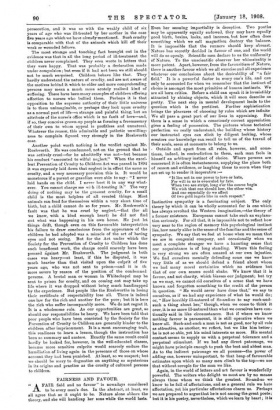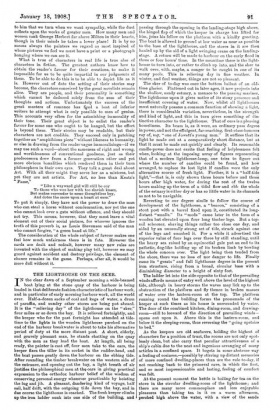FAIRNESS AND FAVOUR.
AFAIR field and no favour" is nowadays considered to be every man's due. In the abstract, at least, we all agree that so it ought to be. Nature alone abhors the theory, and she will handicap her sons while the world lasts.
Even her seeming impartiality is deceptive. Two youths may be apparently equally endowed, they may have equally good birth, brains, looks, and incomes, but how often does something which we call magnetism destroy the balance.
It is impossible that the runners should keep abreast. Nature has secretly decided in favour of one, and the world will do so openly. Scientific men declare to us the uniformity of Nature. To the unscientific observer her whimsicality is more patent. Apart, however, from the favouritism of Nature, there is another favour which we all exercise and all experience whatever our conclusions about the desirability of "a fair field." It is a powerful factor in every one's life, and can only he accounted for when we remember that the instinct of choice is amongst the most primitive of human instincts. We are all born critics. Before a child can speak it is irresistibly attracted by shining objects, which it will soon describe as pretty. The next step in mental development leads to the question which is the prettiest. Further sophistication brings the pleasures of choosing by rules which are infinite We all pass a great part of our lives in appraising. But there is a sense in which a consciously correct appreciation gives a feeling of possession. The pictures whose technical perfection we really understand, the building whose history our instructed eyes can elicit by diligent looking, whose creators our knowledge can recall to tell us of the travail of their souls, seem at moments to belong to us.
• Outside and apart from all rules, however, and some- times, indeed, in contradiction to them, each man feels in himself an arbitrary instinct of choice. Where persons are concerned it is often instantaneous, supplying the place both of reason and evidence, or laughing these to scorn when they are set up to render it inoperative :—
"It lies not in our power to love or hate, For will in us is overruled by fate.
When two are stript, long e'er the course begin
We wish that one should lose, the other win. And one especially do we affect Of two gold ingots like in each respect."
Instinctive sympathy is a fascinating subject. The only theory by which it can be wholly accounted for is one which has always revolted the Western imagination,—the theory of a former existence. Europeans cannot take such an explana- tion seriously. For all that, it is impossible not to reflect how
very near to the region of memory this psychological instinct lies, how nearly alike is the sense of the familiar and the sense of sympathy. We say that we feel at home when we mean that we are in congenial company, and occasionally when we meet a complete stranger we have a haunting sense that our acquaintance is of long standing. Where this feeling is very strong we are often amazed at our own injustice. We find ourselves mentally defending some one we know very little of as we should defend a friend about whom we had many moral certainties which no evidence but that of our own senses could shake. We know that it is favour, and not charity, which biasses our judgment; but try as we may, we cannot rid ourselves of a sense that we have known and forgotten something to the credit of the person in question. " He would never have done that," we say to ourselves, as if we had any experience of what he would do; or, "How horribly ill-natured of So-and-so to say such-and- such a thing about her," though, when we come to think it over, it is no more ill-natured than what we ourselves have con- tinually said in like circumstances. But if where we know nothing favour is paramount, it is still operative where we know all. Such-and-such a man is not as good, nor by all rule as attractive, as another, we reflect, but we like him bettor; he is not so able, yet his mind interests us more. His mental contact seems to supply us with a perpetual tolerance and a perpetual stimulant. If we had any direct patronage, we might have principle enough to push the best and ablest man. As to the indirect patronage we all possess—the power of adding one, however unimportant, to that heap of favourable estimates upon which so many men climb to the top—we use that without scruple for the man we like.
Again, in the world of letters and art favour is wonderfully powerful. The writers who delight us most are by no means always those whom we think the greatest. So-and-so we know to be full of affectations, and as a general rule we hate affectation, yet his particular affectations charm us. Perhaps
we are prepared to argue that he is not among the great poets; but it is his poetry, nevertheless, which we learn by heart ; it is
to him that we turn when we want 'sympathy, while the dust collects upon the works of greater men. How many men and Women rank George Herbert far above Milton in their hearts, hough in their minds he takes a lower place! It is by no Means always the painters we regard as most inspired of Whose pictures we feel we must have a print or a photograph hanging where we can see it. "%Flat is true of characters in real life is true also of characters in fiction. The greatest authors know how to obtain the reader's favour for their creations, to make it impossible for us to be quite impartial in our judgments of them. To be able to do this is to be able to depict life as it is. However out of date the setting of their stories may beCome, the characters conceived by the great novelists remain alive. They are people, and their personality is something which cannot be deduced solely from the sum of their
thoughts and actions. Unfortunately the success of the great masters. of romance has flied a host of inferior
writers to attempt what is only possible to men of genius. This accounts very often for the astonishing immorality of their tone. Their great object is to enlist the reader's favour for some one who ought to be hanged, but the effort is beyond them. Their stories may be readable, but their characters are not credible. They succeed only in patching together an "amphibious piece" without likeness to humanity, or else in drawing from the reader vague immoralisings—if we may use such a word—about the sameness of right and wrong, and worthlessness of conventional goodness, just as their predecessors drew from a former generation other and yet more obvious banalities which rendered them in their turn philosophers in their own eyes. They talk a great deal about Art. With all their might they serve her as a mistress, but yet they are not artists. For Art, no less than Keats's "Fame,"
"Like a wayward girl will still be coy
To those who woo her with too slavish knees, But makes surrender to some thoughtless boy,
And dotes the more upon a heart at ease."
To put it simply, they have not the power to draw the man who can steal a horse without condemnation, nor yet the one who cannot look over a gate without offence, and they should not try. This means, however, that they must leave a vital element out of their social picture, for whoever ignores the
truth of this proverb is as Louis Stevenson said of the man who cannot forgive, "a green hand at life."
The consideration of the whole subject of favour makes one feel how much unfairness there is in fate. However the cards are dealt and redealt, bowever many new rules are invented with the object of making play tell, however we may guard against accident and destroy privilege, the element of
chance remains in the game. Perhaps, after all, it would be more dull without it.







































 Previous page
Previous page